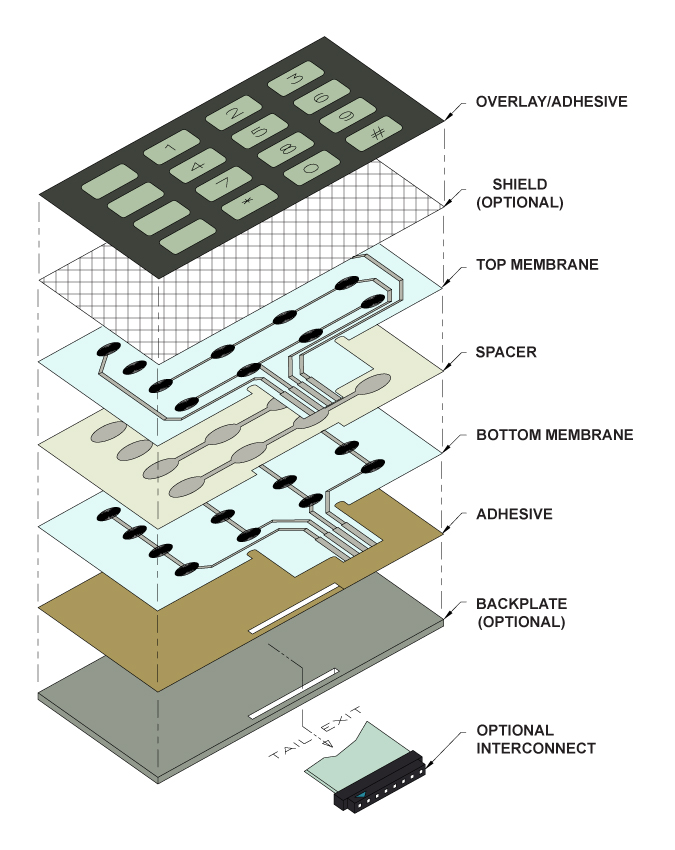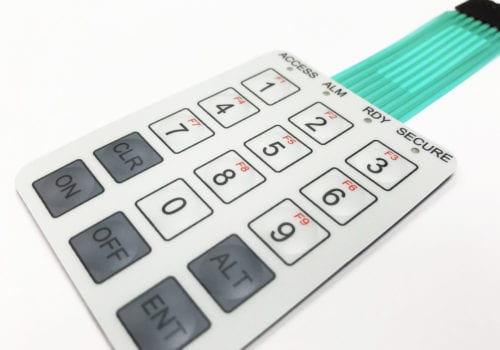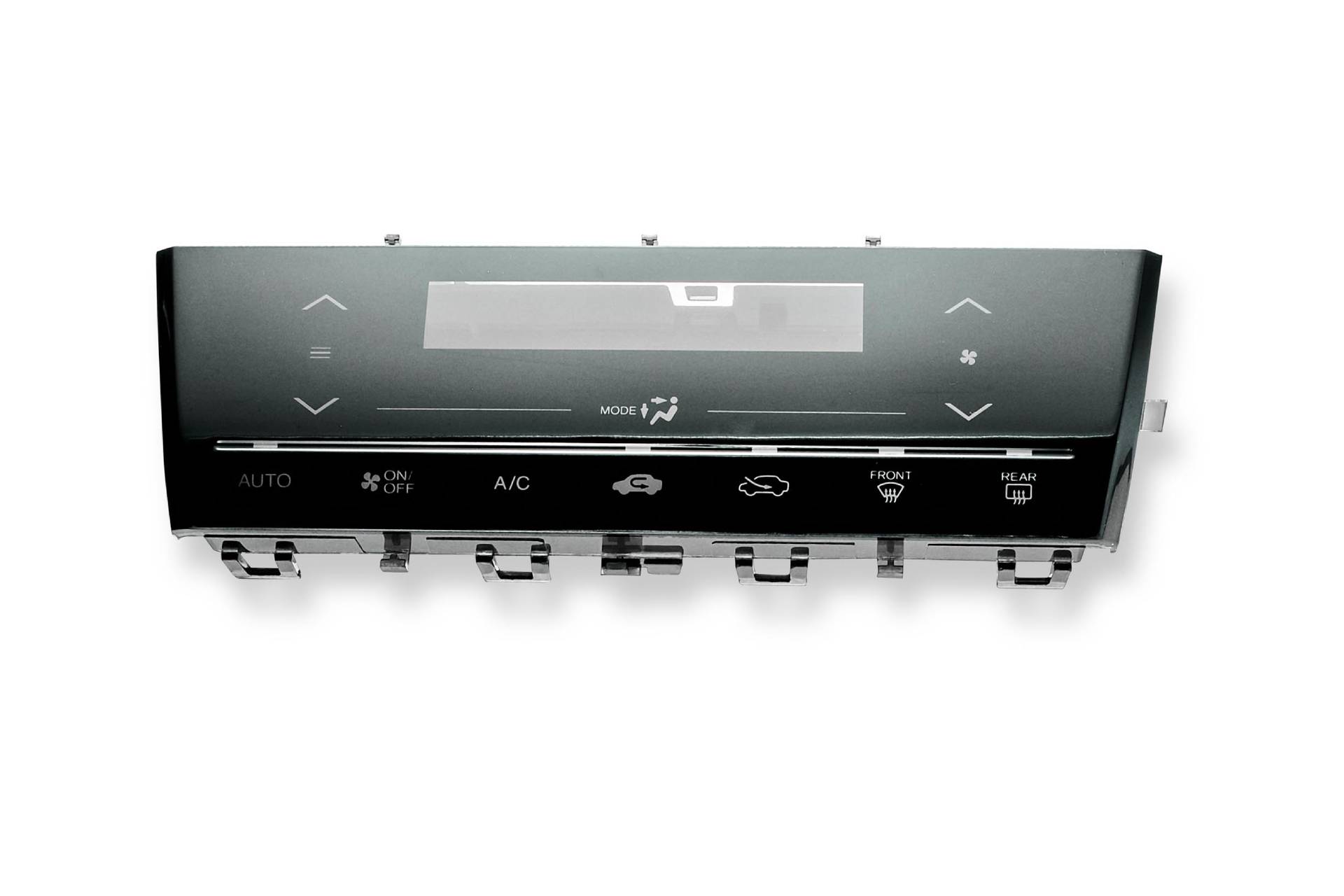Experienced Membrane Switch Manufacturer for Complex Projects
Experienced Membrane Switch Manufacturer for Complex Projects
Blog Article
Comprehending the Relevance of Membrane Switch in Modern Electronic Devices and Their Applications
Membrane changes work as an important component in modern-day electronics, offering a reliable user interface for user interaction. Their personalized and light-weight nature makes them ideal for a variety of applications throughout diverse markets. Understanding their essential elements and benefits can supply insights right into their growing relevance. As modern technology proceeds to breakthrough, the evolution of Membrane switches over questions about their future applications and style developments. What exists ahead in this vibrant field?

What Are Membrane Switches?
Membrane buttons are essential parts in modern-day electronic devices, offering as interface that assist in communication between gadgets and users. These switches contain several layers, consisting of a graphic overlay, a sticky layer, and a circuit layer, every one of which interact to produce a practical and long lasting user interface. The layout permits for a flat, inconspicuous option that can be tailored relating to size, shape, and visual look, making them ideal for different applications, from customer electronic devices to clinical gadgets. The tactile responses supplied by Membrane switches over boosts user experience, while their resistance to dirt and wetness makes them excellent for challenging atmospheres. Furthermore, Membrane switches can incorporate functions such as backlighting and printed graphics, further increasing their functionality. Their adaptability and effectiveness make them a recommended option in markets where integrity and simplicity of use are vital, ultimately contributing to the smooth procedure of modern-day electronic gadgets.
Secret Parts of Membrane Changes
While various components add to the capability of a membrane layer button, 3 primary layers play substantial functions in its design and operation. The leading layer, usually made from a resilient polymer, serves as the user interface for user interaction, usually including published graphics and icons. Under this is the spacer layer, which preserves the essential range in between the leading layer and the circuit layer. This spacer layer assurances that the button triggers only when pushed, stopping unintentional inputs. Ultimately, the circuit layer contains conductive traces that complete the electrical circuit when the top layer is depressed. These traces can be made from various materials, consisting of copper or silver. With each other, these components produce a robust and reputable tool that is compact and functional, appropriate for a variety of digital applications, from family home appliances to medical devices. Recognizing these crucial components is important for valuing the general functionality of Membrane switches.
Benefits of Making Use Of Membrane Switches

Membrane Switch Manufacturing Refine
Understanding the Membrane button production procedure reveals the elaborate steps entailed in generating these necessary components. The procedure generally starts with the design stage, where specs and layouts are developed utilizing specialized software application. Following this, the visuals overlay is published on a flexible substrate, usually utilizing high-resolution printing strategies to guarantee clearness and precision.Next, the adhesive layers are applied, which serve to bond the different parts with each other. The circuit layers, made from conductive inks or materials, are then published onto a separate substrate. These layers are very carefully straightened and laminated flooring to create a practical switch.After setting up, the buttons undergo examining to confirm functionality and resilience. Quality assurance steps are carried out throughout the procedure to recognize and fix any flaws. The completed Membrane switches are packaged and prepared for circulation, ready to satisfy the needs of contemporary digital applications.
Applications of Membrane Switches in Different Industries
Membrane buttons are progressively made use of across various markets, specifically in clinical devices and customer electronic devices. In the clinical field, they provide reputable control interfaces for devices that need specific procedure. Similarly, in customer electronic devices, these switches enhance individual communication by supplying streamlined and receptive interfaces.
Medical Devices Control
Many modern medical tools make use of Membrane buttons for streamlined operation and boosted individual communication. These buttons give a reputable, long lasting interface for a variety of applications, including analysis equipment, client surveillance systems, and surgical tools. Their customizable look what i found designs enable for particular formats that can suit the distinct requirements of healthcare professionals, making sure intuitive navigation and efficient accessibility to vital functions. In addition, Membrane switches are resistant to pollutants, making them suitable for sterile settings. The tactile comments they supply can boost individual confidence, minimizing the danger of errors during important clinical procedures. In general, the integration of Membrane switches in clinical tools considerably contributes to enhanced operational performance and patient safety in medical care setups.
Customer Electronic Devices Interfaces
In the domain of consumer electronics, Membrane buttons play a critical role in boosting interface throughout a variety of tools. These switches are important to items such as push-button controls, microwaves, and pc gaming consoles, supplying a user-friendly and efficient user interface. Their design enables for a seamless assimilation of graphics and functionality, allowing producers to produce smooth, modern appearances without compromising functionality. Membrane switches are likewise understood for their sturdiness, commonly enduring considerable usage and direct exposure to various environmental problems. Furthermore, they can integrate attributes like backlighting and responsive responses, further improving the user experience. As customer demands for advanced yet user-friendly user interfaces expand, Membrane switches over proceed to be an important part in progressing digital tool capability.
Design Considerations for Membrane Switches
Designing reliable Membrane switches over calls for Resources careful interest to numerous factors that influence both functionality and individual experience. One important consideration is the choice of products, as they can affect longevity, tactile responses, and aesthetic charm. Selecting an ideal adhesive is crucial for assuring long-lasting bond and resistance to environmental factors.In addition, the design and layout of the switch need to accommodate customer communication, with switch sizes and spacing optimized for ease of usage. The unification of graphics and labeling must prioritize quality and visibility under various lights conditions.Consideration of electric characteristics, such as actuation force and switch level of sensitivity, will certainly improve the responsiveness of the Membrane switch. Additionally, the layout should accommodate making procedures to guarantee cost-effectiveness and timely production. On the whole, a well-thought-out design boosts both the customer and the performance experience of Membrane buttons in contemporary electronics.

Future Patterns in Membrane Switch Modern Technology
As modern technology remains to develop, Membrane switches are poised to incorporate brand-new innovations that will boost their functionality and application in various fields. One substantial fad is the incorporation of resilient and versatile products, which will certainly enhance the life-span and integrity of these buttons. Improved surface area structures and adjustable graphics are also expected, enabling more user-friendly individual interfaces.Moreover, the combination of smart modern technology, such as touch-sensitive surfaces and haptic responses, is anticipated to enhance individual communication, making Membrane switches over more responsive and engaging. Furthermore, advancements in printed electronics will enable much more complicated circuitry within thinner profiles, better increasing layout possibilities.Sustainability will likewise play an important function in future advancements, as manufacturers check out environmentally friendly products and manufacturing procedures. Overall, these fads will certainly assure that Membrane changes remain relevant and essential in a progressively electronic and interconnected world.
Regularly Asked Questions
Exactly How Do Membrane Changes Compare to Traditional Mechanical Buttons?
Membrane changes deal benefits over standard mechanical switches, consisting of Website reduced size, lighter weight, and boosted sturdiness. They generally offer a sealed surface, boosting resistance to dust and moisture, making them optimal for diverse applications.
What Products Are Typically Made Use Of in Membrane Switch Building And Construction?

Can Membrane Switches Over Withstand Extreme Environmental Issues?
Membrane buttons can endure extreme environmental problems, depending upon their design and materials. Premium buildings typically feature toughness against temperature fluctuations, humidity, and exposure to chemicals, making them ideal for different demanding applications across sectors.
The Length Of Time Do Membrane Switches Over Usually Last Before Failure?
Membrane switches generally display a life-span ranging from 1 to 10 million actuations, depending upon factors such as usage frequency, ecological problems, and making high quality. Normal upkeep can extend their resilience and operational reliability considerably.
Are Membrane Switches Customizable for Specific Applications?
Membrane switches are indeed customizable for specific applications. They can be tailored in style, dimension, and performance, allowing makers to fulfill distinct user needs and enhance item aesthetic appeals while preserving operational efficiency and longevity. Membrane switches are necessary elements in modern electronics, offering as user interfaces that facilitate interaction between users and devices. The responsive responses supplied by Membrane switches over boosts user experience, while their resistance to dirt and dampness makes them excellent for testing atmospheres. The unification of graphics and labeling need to focus on clarity and exposure under numerous lighting conditions.Consideration of electric attributes, such as actuation force and switch level of sensitivity, will certainly enhance the responsiveness of the Membrane switch. Boosted surface area textures and adjustable graphics are additionally anticipated, allowing for more intuitive individual interfaces.Moreover, the assimilation of wise innovation, such as touch-sensitive surfaces and haptic responses, is anticipated to improve user interaction, making Membrane switches over more engaging and receptive. Membrane switches deal advantages over conventional mechanical switches, consisting of minimized dimension, lighter weight, and enhanced resilience.
Report this page